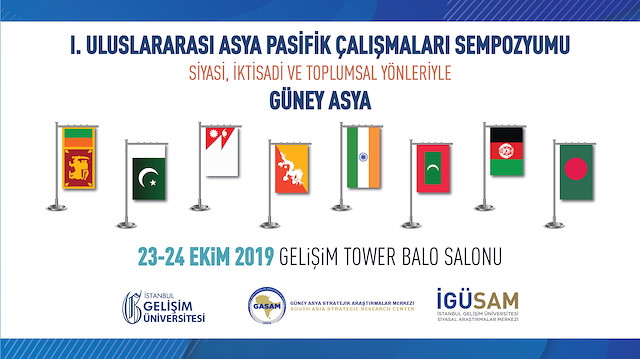
Prominent academics to discuss politics, culture, economy and humanitarian crises in the region
A symposium on South Asia began in Istanbul on Wednesday with the inaugural speech of Burhan Aykac, rector of Istanbul Gelisim University.
The two-day event, dubbed as the 1st International Asia-Pacific Studies Symposium, will host around 50 experts and academic from Afghanistan, Bangladesh, India, Pakistan, Sri Lanka, Malaysia and Turkey.
“We aim to draw world attention to the Asia-Pacific region, as the region is getting importance in the world's trade and politics," Aykac said, adding the main focus of this year's symposium will be the political, economic and social aspects in South Asia.
"This Asia-Pacific Conference will continue with a wide range of issues across the region," Aykac said.
He also stressed that the Asia-Pacific region will be the focus point of the world politics as China and India are diligent to increase political and economic presence and influence in the region.
"As we understood from the recent development in Syria and the Middle East, the U.S. is diverting its direction from the Middle East to the Asia-Pacific region," said Hasan Oktay, vice rector of International Vision University in North Macedonia.
"Almost all countries in Asia and Pacific region, mainly in south Asia, is slowly getting occupied by China. We need to produce policy to counter this occupation and I believe this symposium is going to serve this goal," he added.
Director of Public Diplomacy Application and Research Center at Kirklareli University Muharrem Eksi said the region drew Turkey's attention in early 2000s.
"We are witnessing the thriving economy in the region that hosts around 30% of the world economy," said Eksi, noting that Ankara's economic and trade relations with the region got momentum in recent years.
"Turkey has increased its embassy number to 15 in Asia And Pacific Region," he noted.
He also mentioned that the U.S. has started close cooperation with India to balance the Chinese influence in the region as Washington put forward a terminology of Indo-Pacific to refer to Asia-Pacific region.
"Along with its economy and trade, the region has potential for political and regional conflicts, for example the issue of South China Sea, the Kashmir dispute between two nuclear-armed neighbors [India and Pakistan], the Afghan war and Rohingya refugee crisis," he added.
Dozens of academics across the region will present their papers on several regional issues, including political, economic, social, cultural and ethical aspects.


